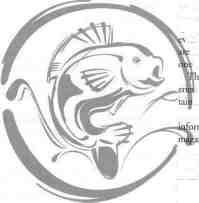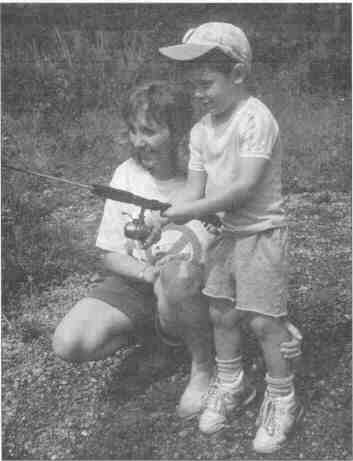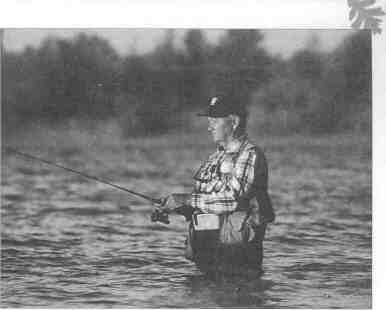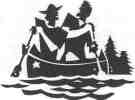OUR NATURAL RESOURCES
Need a Fishing Buddy?
Join a Club!
BY JOHN ALLEN
|
Whether your interest is fly-casting or
bass angling, you can find a niche in
a variety of Illinois fishing clubs.
|
|

|
Picture this: the family is day-tripping, the
household chores are finished and the weather's
perfect for fishing. Too bad no one's around to
wet a line with you.
If you're an angler who hates fishing alone, a novice
who'd like to learn
the intricacies of fly
fishing, an activist
determined to protect the water of a
particular lake or stream, or a sportsman yearning to kibitz with like-minded souls, the place
for you might just be a fishing club.
In Illinois, there's a club for about every type
of fishing imaginable. There are affiliates of national organizations, groups devoted to certain
species, locations or equipment, private clubs,
even leagues for competitive fishermen. There
so many and such a variety, in fact, that no
knows the names of them all.
|
The Department of Natural Resources' Fish and Constituency Services divisions maintain lists of key constituent groups, but neither
list is all-inclusive. Other good sources for club
information are bait shops, regional fishing
magazines and the Internet.
Club members can also be fonts of knowledge, as many belong to more than one group.
Even if we had a comprehensive list, there
wouldn't be space for it here. However, we can
provide you with a look at a few representative
clubs, along with phone numbers and contact
persons.
Select a Species
The largest fishing group is the Bass Anglers
Sportsman Society (BASS), which has about
600,000 members nationally. Established by
Ray Scott in 1971, BASS is a not-for-profit
organization that promotes catch-and-release
bass fishing and various youth, charity and conservation projects.
Approximately 1,700 Illinoisans belong to
94 local chapters of the Illinois BASS Federation, which is affiliated with the National BASS
Federation, according to John Gross, IBF vice
president.
Gross is a member of a Springfield chapter,
the Lincolnland BassMasters. The club is open
to both men and women ages 16 and over.
Prospective members should call Bob Cleaver
at 217.523.0155.
During their meetings, the 22 members and
officers of Lincolnland BassMasters discuss
upcoming fishing tournaments, youth activities, fund-raisers and social functions, Gross said.
Members fish together as friends, in local club
tourneys or in statewide tournaments sponsored
by the IBF. "We fish all over the state, but only
in Illinois," Gross added.
The Springfield club holds potluck dinners,
cook-outs and a Christmas party, inviting both
their own families and prospective club members to take part. "We welcome new members,
but we're more than just a fishing club," Gross
said. "It's not about drinking beer and catching
fish. Our bylaws say that members must participate in our activities, not just sit home and
send in their dues."
May/June 1999 /43
|

Numerous Illinois fishing clubs
are family oriented. They not
only teach kids to fish, but also
promote family unity.
|
Lincolnland members pay yearly dues of $10
to the local club; $14 to the IBF; $12 to the
NBF; and $ 17 to BASS. Dues support all local
club functions, state and local bass stocking programs, clean water initiatives and youth programs such as "Casting Kids." In exchange for
their dues, members receive monthly issues of
BassMasters and MidWest Outdoors magazines
and the BASS-Times newspaper. They are also
entitled to fish in the six tournaments IBF sponsors each year in Illinois.
In accord with BASS goals. Gross said the
IBF works with the Department of Natural
Resources on political and environmental issues that protect and enhance bass fishing. IBF
is also heavily involved with youth, sponsoring
at least two junior chapters in the Chicago area.
If you're a bass fisherman interested in more
than just angling, BASS may be the club for
you. More information about the organization
is available by calling Stan Leach of the IBF at
217.632.3110, or accessing the IBF website
on the Internet at www.ilbassfed.com.
|
Some other species-specific groups and contact persons include:
• The Illinois Smallmouth Alliance. John
Graham, 309.432.2356
• Perch America. JackVadas, 773.734.6720
• The Carp Anglers Group. Bud Yancey,
309.387.CARP
• Salmon Unlimited. Jean Sliwa, 773.
736.5757
• Salmon Sport Fishing Club. John Massard,
630.980.1917
• Illinois Steelheaders. Jeff Berg,
630.629.5681
• Walleye Unlimited. Mike Orawiec,
847.872.7569
• Muskies Inc. Ray Buder, 630.553.5564
• Illini Muskies Alliance. John Weirich, 847.
361.9033; e-mail: Muskiejohn@msn.com
• American Catters. Dick Johnson,
618.372.4108
• Illinois Council of Trout Unlimited, Joe
Hammon, 708.453.8102
The Neighborhood
While some anglers will travel to the ends of
the earth to chase bass or muskie, others couldn't
care less about what they catch as long as they
don't have to go too far to catch it. For these
folks there are site- or area-specific fishing clubs.
A good example of a site-specific club is the
44/ Illinois Parks and Recreation
Shabbona Lake Sportsman's Club. According
to Club President Rich McElligott, the
110-member organization exists solely to enhance and protect the fishery at Shabbona Lake
in DeKalb County.
The club's yearly dues are $15 per family,
and there's an annual raffle and occasional seminars, with all proceeds going to lake enhancement projects. The list of club accomplishments
is lengthy, but some of the more notable ones
include the installation of in-water rock bars
and fish cribs, fish-barrier netting across the
top of the dam, and construction and maintenance of walleye, largemouth and smallmouth
rearing ponds.
McElligott said the club also sponsors family
fishing clinics and a youth fishing league, and
aids the local Lions Club in its annual fishing
programs for the blind. The sportsman's club
has no social programs, but the public is invited to attend meetings and take part in fishing clinics.
Meetings are held at 2 p.m. on the first Sunday of each month. The club meets at the Welcome Matt in Hinckley in the winter, and at
the boat dock on the lake from May to October.
The club usually fishes together as a group
after meetings, McElligott said, adding that
members also get together informally to fish
Shabbona and other lakes. "Most of our members fish whenever they have time," he said.
To receive a free club brochure, prospective
members should call 815.824.2415, visit any
bait shop in Shabbona, or write to the Shabbona
Lake Sportsman's Club, P.O. Box 332,
Shabbona, III. 60550.
Area-specific clubs include the 350-member Mississippi Valley Hunters & Fisherman's
Association, located in the Quincyarea.
Club President Allie Lymenstull said membership is limited to men ($3 per year) and
boys under age 16 ($1 per year), but women
are welcome to attend events. These include
fish fries held after the spring crappie/bluegill
and August catfish/carp tournaments, and a
trap shoot held in February.
Lymenstull said club members fish the Mississippi River, Mark Twain Lake, Siloam Springs
State Park Lake and other bodies of water in the
area.
|

|
The club meets at either 6:30 or 8 p.m. on
the first Thursday of each month at various
places in Quincy. Prospective members should
call Lymenstull at 217.222.2444.
Other site- or area-specific clubs include:
• Rock River Fishing Club. Moe Kielsmeier,
815.732.2311.
• Vandalia Sport Fishing & Conservation
Club. John Biythe, 618.283.2475.
• Better Fishing Association of Northern Illinois (Hennepin Canal). Tom Wall,
815.223.3671.
• Fox Valley Area Anglers.Daryl Miller,
630.584.1932
• North Shore Rod & Reel. John Fogelson,
847.869.7877
|
No Place Like Home
If your dream lake's "fishing club" has four
walls, a kitchen, a stocked bar, and oh yeah,
other people who fish, then you might want to
consider something like the Southeast
Sportsmen's Club. Located on Wolf Lake, the
100-member club's facility includes all of the
above, plus a picnic area, fishing pier, boat
launch and free boat storage.
According to dub member Jack Vadas, meetings are held at 7:30 p.m. the second Wednesday of each month at the clubhouse, 131st
Street and Avenue M in Chicago. This independent clubs agenda consists of sponsoring
lake cleanups, Arbor Day tree plantings, Free
Fishing Days events, hunter safety classes and
kids' fishing clinics.
Vadas said members fish against each other
in club tournaments, and occasionally against
other clubs, with most angling done on Wolf
Lake. The club also hosts an annual picnic, a
"smoker" and a Christmas party for members'
children and grandchildren. All events except
the Christmas party are open to the public.
Southeast Sportsmen's Club dues are $ 100 per
year, which goes for club maintenance.
For more information about this organization, call Vadas at 773.734.6720.
Clubs that have their own facilities are probably the hardest listings to find, as the number
of members is usually limited and openings are
passed on either to relatives or close friends. We
do have a couple you might call:
• Dolton Izaak Walton League. Terry Fanning, 708.849.5155
• Bountiful Hunting & Fishing Preserve
(Mount Vernon). Bob Davis,
618.242.3409
• Briar Knoll Hunting & Fishing Inc. (Rockford). 815.857.2320
A World Of Their Own
As anyone who's ever fly-fished or watched a
May/June 1999 /45
fly-fisherman knows, this is a different world
than regular fishing. The skills and concentration needed to land a fish are totally different
than those used by bait-casters or (rollers.
If this cerebral sport suits your fancy, call Karl
Crapse, president of the Central Illinois Fly Fishers, at 217.893.1942. Crapse said the 25 members of his club meet at state park lakes in warm
weather months, have presentations on specific topics related to fly fishing, then go off on
their own to practice what they just learned.
Club members pay $ 15 per year in dues,
which defray such club expenses as the monthly
newsletter, and also cover affiliate dues to the
national Federation of Fly Fishers. Crapse said
the club's sole agenda is the promotion of fly
fishing. It does not have its own facilities, and
there are no social programs.
Given the solitary reputation of the sport,
it's perhaps fitting that Crapse said: "We don't
really invite the general public to join us. Its
strictly word-of-mouth for people interested in
fly fishing. Men, women and kids can join, but
only if they want to really learn fly fishing."
If you aren't from the Rantoul area where
Crapse and friends fish, try calling one of these
numbers for more fly-fishing information:
• Federation of Fly Fishers. 406.585.7592
• DuPage River FlyTyers. Stan Zarnowiecki,
708.354.1144
A League of Their Own
Another distinct group is the match anglers,
such as those affiliated with the Chicagoland
Bank Anglers. These groups "hope to grow the
sport of fishing" through competitive matches,
said Ralph Grasso, club founder.
With 150 members of all ages and abilities,
the CBA views matches as social, environmental, educational and piscatorial opportunities.
"All the matches are social programs that include matches, the meetings and a family
picnic," Grasso said.
CBA dues are $20 for an individual or $40
per family. However, Grasso said, one need not
be a member to fish in the matches. Also, since
all fishing is done from shore, disabled persons
are easily accommodated and beginners are introduced to the sport in a non-intimidating
environment.
The matchfishing schedule runs from
April-June and September-October, but CBA
has activities throughout the year, including
general meetings at the Daley Plaza, seminars
and ice fishing events, Grasso said.
Matchfishing is a spectator sport outside the
United States, and its popularity here is growing. Unlike BASS, however, there is no national
organization. "There will be a national organization soon, but our affiliation now is with other
matchfishing clubs and bank angling clubs,"
Grasso said.
Prospective members should call Grasso at
312.902.2535 or Steve Somen at
312.266.8270. In the northwest suburbs of
Chicago, call:
• Northwest Match Anglers. Hahnz Teope.
630.837.1124
Even Kids with Chickenpox?
As the CBA's mission statement notes, getting young people involved is the best way to
ensure the future of fishing. In the June 1998
issue of Outdoor Illinois, we told you about
"Fishin' Buddies!," an adult-run club for
inner-city youth. It's a former affiliate of BASS
and provides role models and mentoring for
children who lack adult guidance. Information
is available from John Kidd, 773.233.3254.
We've described a diverse menu of clubs here,
but not nearly all of them. Groups we haven't
mentioned that would welcome new members
should contact the DNR Division of Constituency Services. The division is always willing to
update its mailing lists. Write to:
Tracy Shafer
524 S. Second St.
Springfield, 111. 62701
217.782.4963
e-mail tshafer@dnrmail.state.il.us
JOHN ALLEN
is a staff writer for Outdoorillinois, a publication of the illinois
Department of Natural Resources. This article is reprinted with
permission from the April 1999 issue of OufdoorIllinois
46/ Illinois Parks and Recreation
DNR's 1999 Fishing Booklet
Now Available
The start of the new sport fishing season on April 1 will find good fishing
prospects on Illinois waters and few changes in regulations for anglers,
according to Department of Natural Resources Director Brent Manning.
A new 24-hour license is available to resident and non-resident anglers for $5.50. A new state law also allows the Department to issue free
group permits as part of sport fishing promotional efforts.
Manning encourages local anglers to pick up a copy of the 1999
Illinois Fishing Information guide to review the statewide and sitespecific regulations that will affect them in the new season. The booklet
is free and is available at sporting goods stores, bait shops and wherever
fishing licenses are sold.
Among site-specific regulations in effect of the 1999 fishing season
are an 8-inch minimum size limit and 10-fish daily catch limit for
bluegill and redear sunfish on 16 lakes throughout the state. The DNR
Division of Fisheries and Illinois Natural History Survey are conducting
a research project aimed at improving the size structure of bluegill in
Illinois waters.
"The experimental size limit for bluegill and redear sunfish should
allow smaller males to grow in those targeted bodies of water," said DNR
Fisheries Division Chief Mike Conlin, adding that the harvest regulations would be assessed for the next five years.
The bluegill and redear sunfish 8-inch minimum size and 10-fish
catch limits will be in place at Bullfrog, Busse and Tampier lakes in
Cook County, Dolan Lake Forbes State Lake, Homer Lake and Lake of
the Woods, Lake Bloomington, Lake Jacksonville, Lake Kakusha, Mermet
State Lake, Pana Lake, Pierce Lake, Red Hills Lake, Walnut Point Lake
and Walton Park Lake.
States, USFWS Assess
in Sport Fish Funds
The U.S. Fish and Wildlife Service will distribute nearly $378 million
in final apportionments to states this year in Federal Aid in Sport Fish
and Wildlife Restoration funds. These funds are provided by hunters,
anglers and boaters who pay special excise taxes on their equipment and
boating fuels.
For 1999, a total of $212.4 million is being distributed to states
under the Sport Fish Restoration Program. Last year the program distributed $272 million to the states. The current year distribution represents a 22-percent reduction in Sport Fish Restoration Program fund
apportionments to states this year.
"The Fish and Wildlife Service recognizes that although the new
legislation provides benefits for boat safety, many states' Sport Fish Restoration Program projects will suffer from this reduction in funding,"
said Service Director Jamie Rappaport dark. "The Service is working
closely with the states and its other conservation partners to find ways to
soften the impact of this reduction and to resolve this issue in terms of its
future impact on the program."
The decline is due to changes brought about by the 1998 Transportation Equity Act for the 21st Century (TEA-21). Because of an accounting provision in the new law, program receipts from 1998 have
been used to fund state boating-safety programs for both 1998 and
1999, totaling $ 109 million. The Service and its conservation partners
are analyzing the newly mandated accounting approach to determine
any long-term implications to the program.
|

|
States use Sport Fish Restoration Program funds to stock fish; acquire and improve sport
fish habitat; provide
aquatic resource education opportunities;
conduct fisheries research; build boat ramps, fishing piers and other recreational facilities;
and engage in other related activities.
Funding for the Sport Fish Restoration Program comes from a 10percent excise tax on fishing equipment, a 3-percent tax on electric
trolling motors and sonar fish finders, taxes on motorboat and small
engine fuels, and import duties on fishing tackle and pleasure boats.
|
A total of $165.4 million was apportioned to the states this year
under the Wildlife Restoration Program. Of this total, $27 million is
allocated for hunter education. State apportionments for wildlife restoration are up more than $10 million from last year's total of $154.8
million.
The Wildlife Restoration Program is funded by an 11-percent excise
tax on sporting firearms and ammunition as well as a 12.4-percent tax
on archery equipment and a 10-percent tax on handguns. States use
these funds to restore and manage wild bird and mammal populations
and to provide hunter education to the public.
Among its responsibilities, the U.S. Fish and Wildlife Service oversees
the federal aid program that distributes hundreds of millions of dollars
in excise taxes on fishing and hunting equipment to state fish and
wildlife agencies.
May/June 1999 /47
Boat and Canoe Access Improved
with DNR Grants
Gov. George H. Ryan has announced $1 million in boat and canoe access grants to 11 local governments.
"These funds will help communities provide better public access to
our rivers, lakes and streams, allowing Illinoisans to enjoy the many
recreational benefits these waterways provide," Ryan said.
The facilities will serve the communities on Lake Decatur,the Kinmundy Reservoir and Lake Taylorville as well as
the Chicago, Des Plaines, Fox, Kishwaukee, Mississippi and Rock rivers.
The grants, administered by the Department of
Natural Resources, are awarded competitively.
Twenty-eight applications totaling more than $3.3
million were submitted to the Department for consideration.
|

|
The grant program is funded through fees that
boaters pay on motor fuel and registrations for boats
and canoes. The grants can provide up to 100-percent funding for construction of new and improved public boat access
facilities and 90-percent funding for land acquisition costs related to
providing boat access facilities. The maximum grant award allowed is
$200,000.
Applications for next year's program can be submitted between July
1 and Sept. 1. More information is available from DNR's Division of
Grant Administration, 524 S. Second Street, Springfield, III., 62701-
1787, or by calling 217.782.7481.
|
Grant recipients for this year are: city of Chicago, $50,000 to construct a non-motorized boat and canoe access launch, develop an access
road and install security lighting at Clark Park; Cook County Forest
Preserve District, $50,000 to construct a canoe access/portage structure, a paved access trail, shoreline stabilization, landscaping and signs
along the Des Plaines River; Decatur Park District, $ 168,000 to construct a boat ramp, canoe and small boat access dock, a restroom parking
area, walkways, pier reconstruction, drainage and channel improvements
at the Sportsmen's Park Boat Access site on Lake Decatur; city ofGrafton,
$165,000 to improve existing boat ramps, construct a new parking
area, a two-lane boat ramp with courtesy docks, mobile
restroom facilities and provide security lighting at the
public launch area located at the confluence of the
Illinois and Mississippi rivers; Kendall County Forest
Preserve District, $32,500 to develop a canoe launch,
A parking lot, pathways, a drinking well and hand pump,and signs and landscape restoration on the Fox River;city of Kinmundy, $ 100,000 to develop a public boat
access rea at the newly constructed Kinmundy Reservoir. Construction includes a single lane launch, a concrete approach area and a parking area; village of
Lincolnshire, $ 12,000 to develop the first canoe access to the Des Plaines
River in Lincolnshire with the construction of an accessible canoe launch
and landscaping; city of Rock Island, $ 100,000 to construct boat launch
facilities and a courtesy dock on the Rock River at Ben Wllliamson Park;
Savanna Park District, $ 125,000 to reconstruct the boat ramps, construct restroom facilities, sidewalks and lighting on the Mississippi River
at Marquette Park; city of Taylorville, $ 160,000 to replace the existing
boat ramps and docks and to reconstruct the parking area and restroom
facilities at the Lake Taylorville Boat Ramp site; andWinnebago County
Forest Preserve District, $35,000 to develop a canoe launch area and
parking area on the Kishwaukee River at the Blackhawk Springs Forest
Preserve near Cherry Valley.
|
E-plates Bring in $7.3 Million
in Additional Funds
Sporting a cardinal and a stalk of prairie grass against a blue background, Illinois' environmental license plates have been ordered or reordered nearly 300,000 times and currently are affixed to more than 80,000 vehicles, according to tallies compiled by the Department
of Natural Resources' Division of Budget and Accounting Services. Since its inception in 1994, the environmental license plate
program has allocated $25 from the purchase price of each plate to the State Parks Fund. To date, plate sales have resulted in raising
more than $7.3 million for supplemental funding to state park programs and maintenance.
The plates are available for passenger vehicles, recreational vehicles and as vanity and personalized plates. To inquire about obtaining
environmental license plates for your vehicle, contact the Illinois Secretary of Stale's office at 1.800.252.8980. For hearing-impaired
individuals, the TTY number is 1.800.252.2904.
|
48/ Illinois Parks and Recreation




